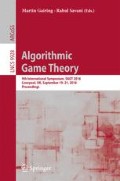Abstract
We wish to motivate the problem of finding decentralized lower-bounds on the complexity of computing a Nash equilibrium in graph games. While the centralized computation of an equilibrium in polynomial time is generally perceived as a positive result, this does not reflect well the reality of some applications where the game serves to implement distributed resource allocation algorithms, or to model the social choices of users with limited memory and computing power. As a case study, we investigate on the parallel complexity of a game-theoretic variation of graph coloring. These “coloring games” were shown to capture key properties of the more general welfare games and Hedonic games. On the positive side, it can be computed a Nash equilibrium in polynomial-time for any such game with a local search algorithm. However, the algorithm is time-consuming and it requires polynomial space. The latter questions the use of coloring games in the modeling of information-propagation in social networks. We prove that the problem of computing a Nash equilibrium in a given coloring game is PTIME-hard, and so, it is unlikely that one can be computed with an efficient distributed algorithm. The latter brings more insights on the complexity of these games.
This work is partially supported by ANR project Stint under reference ANR-13-BS02-0007 and ANR program “Investments for the Future” under reference ANR-11-LABX-0031-01.
Access this chapter
Tax calculation will be finalised at checkout
Purchases are for personal use only
References
Ballester, C.: NP-completeness in hedonic games. Games Econ. Behav. 49(1), 1–30 (2004)
Bondy, J.A., Murty, U.S.R.: Graph Theory. Graduate Texts in Mathematics. Springer, London (2008)
Burani, N., Zwicker, W.S.: Coalition formation games with separable preferences. Math. Soc. Sci. 45(1), 27–52 (2003)
Chatzigiannakis, I., Koninis, C., Panagopoulou, P.N., Spirakis, P.G.: Distributed game-theoretic vertex coloring. In: OPODIS 2010, pp. 103–118 (2010)
Condon, A.: A theory of strict P-completeness. Comput. Complex. 4(3), 220–241 (1994)
Ducoffe, G., Mazauric, D., Chaintreau, A.: The complexity of hedonic coalitions under bounded cooperation (submitted)
Feigenbaum, J., Papadimitriou, C.H., Shenker, S.: Sharing the cost of multicast transmissions. J. Comput. Syst. Sci. 63(1), 21–41 (2001)
Gairing, M., Savani, R.: Computing stable outcomes in hedonic games. In: SAGT 2010, pp. 174–185 (2010)
Greenlaw, R., Hoover, H.J., Ruzzo, W.L.: Limits to Parallel Computation: P-Completeness Theory. Oxford University Press, Oxford (1995)
Karloff, H., Suri, S., Vassilvitskii, S.: A model of computation for MapReduce. In: SODA 2010, pp. 938–948 (2010)
Kearns, M., Suri, S., Montfort, N.: An experimental study of the coloring problem on human subject networks. Science 313(5788), 824–827 (2006)
Kleinberg, J., Ligett, K.: Information-sharing in social networks. Games Econ. Behav. 82, 702–716 (2013)
Marden, J.R., Wierman, A.: Distributed welfare games. Oper. Res. 61(1), 155–168 (2013)
Panagopoulou, P.N., Spirakis, P.G.: A game theoretic approach for efficient graph coloring. In: ISAAC 2008, pp. 183–195 (2008)
Papadimitriou, C.H.: Computational Complexity. Wiley, Reading (2003)
Vassilevska Williams, V.: Fine-Grained algorithms and complexity (invited talk). In: STACS 2016 (2016)
Author information
Authors and Affiliations
Corresponding author
Editor information
Editors and Affiliations
Rights and permissions
Copyright information
© 2016 Springer-Verlag Berlin Heidelberg
About this paper
Cite this paper
Ducoffe, G. (2016). The Parallel Complexity of Coloring Games. In: Gairing, M., Savani, R. (eds) Algorithmic Game Theory. SAGT 2016. Lecture Notes in Computer Science(), vol 9928. Springer, Berlin, Heidelberg. https://doi.org/10.1007/978-3-662-53354-3_3
Download citation
DOI: https://doi.org/10.1007/978-3-662-53354-3_3
Published:
Publisher Name: Springer, Berlin, Heidelberg
Print ISBN: 978-3-662-53353-6
Online ISBN: 978-3-662-53354-3
eBook Packages: Computer ScienceComputer Science (R0)

